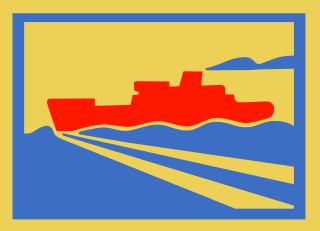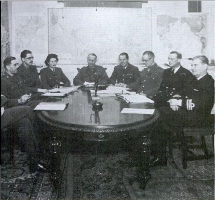
Operation Fortitude was the code name for a World War II military deception employed by the Allied nations as part of an overall deception strategy during the build-up to the 1944 Normandy landings. Fortitude was divided into two sub-plans, North and South, with the aim of misleading the German High Command as to the location of the invasion.

Operation Bodyguard was the code name for a World War II deception plan employed by the Allied states before the 1944 invasion of northwest Europe. The plan was intended to mislead the German high command as to the time and place of the invasion. The plan contained several operations, and culminated in the tactical surprise over the Germans during the Normandy landings on 6 June 1944 (D-Day) and delayed German reinforcements to the region for some time afterwards.

Operation Quicksilver was a military deception operation performed during the Second World War. Undertaken by the Allies in 1944, the operation threatened an invasion of France in the Pas de Calais region through the simulation of a large Field Army in South East England. Quicksilver formed part of the Operation Fortitude deception, itself part of the strategic Operation Bodyguard plan. The key element of Quicksilver was to convince the Germans that "First United States Army Group" (FUSAG) commanded by General George Patton would land in the Pas-de-Calais for the major invasion of Europe, after the landings in Normandy had lured the German defenders to that front.

Operation Copperhead was a small military deception operation run by the British during the Second World War. It formed part of Operation Bodyguard, the cover plan for the invasion of Normandy in 1944, and was intended to mislead German intelligence as to the location of General Bernard Montgomery. The operation was conceived by Dudley Clarke in early 1944 after he watched the film Five Graves to Cairo. Following the war M. E. Clifton James wrote a book about the operation, I Was Monty's Double. It was later adapted into a film, with James in the lead role.

Operation Ironside was a Second World War military deception undertaken by the Allies in 1944. It formed part of Operation Bodyguard, a broad strategic deception plan instigated by the Allies throughout the year to help cover the June 1944 invasion of Normandy. Ironside supported the overall deception by suggesting to the Germans that the Allies would subsequently land along the Bay of Biscay. It complemented efforts to deceive the Germans into believing that the Allies would also land in southern France at this time. Bordeaux was an important port for the German war effort and had already been a target of commando raids two years earlier. Ironside intended to play on German fears of an invasion in the region, with the aim of tying down defensive forces following Operation Overlord in June 1944.

Operation Titanic was a series of military deceptions carried out by the Allied Nations during the Second World War. The operation formed part of Operation Bodyguard, the cover plan for the Normandy landings in 1944. Titanic was carried out on 5–6 June 1944 by the Royal Air Force and the Special Air Service. The objective of the operation was to drop 500 dummy parachutists in places other than the real Normandy drop zones, to deceive the German defenders into believing that a large force had landed, drawing their troops away from the beachheads and strategic sites such as Caen.

The 80th Infantry (Reserve) Division was an infantry division of the British Army formed at the beginning of 1943, during the Second World War. For the twenty months that the division existed, it was a training formation. It was made responsible for providing final tactical and field training to soldiers who had already passed their initial training. After five additional weeks of training, the soldiers would be posted to fighting formations overseas. Notably, the division was used as a source of reinforcements for the 21st Army Group, which was fighting in Normandy. After all available troops left the United Kingdom for France, the division was disbanded.

The London Controlling Section (LCS) was a British secret department established in September 1941, under Oliver Stanley, with a mandate to coordinate Allied strategic military deception during World War II. The LCS was formed within the Joint Planning Staff at the offices of the War Cabinet, which was presided over by Winston Churchill as Prime Minister.
Lieutenant-Colonel Roger Fleetwood Hesketh, born Roger Bibby-Hesketh, was a Conservative Party politician in the United Kingdom. He was Member of Parliament (MP) for Southport from 1952 to 1959.

Brigadier Dudley Wrangel Clarke, was an officer in the British Army, known as a pioneer of military deception operations during the Second World War. His ideas for combining fictional orders of battle, visual deception and double agents helped define Allied deception strategy during the war, for which he has been referred to as "the greatest British deceiver of WW2". Clarke was also instrumental in the founding of three famous military units, namely the British Commandos, the Special Air Service and the US Rangers.
Operation Cockade was a series of deception operations designed to alleviate German pressure on Allied operations in Sicily and on the Soviets on the Eastern Front by feinting various attacks into Western Europe during World War II. The Allies hoped to use Cockade to force the Luftwaffe into a massive air battle with the Royal Air Force and U.S. Eighth Air Force that would give the Allies air superiority over Western Europe. Cockade involved three deception operations: Operation Starkey, Operation Wadham, and Operation Tindall. Operation Starkey was set to occur in early September, followed by Operation Tindall in mid September, and lastly Operation Wadham in late September 1943.
During World War II the British Army made extensive use of fictional army formations, as part of strategic or tactical military deceptions. Their use was pioneered by Dudley Clarke during the North African campaign. Clarke eventually formulated an elaborate order of battle deception to mislead the Axis high command as to the strength of Allied forces in the region. Based on these successes the London Controlling Section made extensive use of notional formations during Operation Bodyguard - a deception operation ahead of the June 1944 Normandy Landings.

Operation Hardboiled was a Second World War military deception. Undertaken by the Allies in 1942, it was the first attempt at deception by the London Controlling Section (LCS) and was designed to convince the Axis powers that the Allies would soon invade German-occupied Norway. The LCS had recently been established to plan deception across all theatres, but had struggled for support from the unenthusiastic military establishment. The LCS had little guidance in strategic deception, an activity pioneered by Dudley Clarke the previous year, and was unaware of the extensive double agent system controlled by MI5. As a result, Hardboiled was planned as a real operation rather than a fictional one. Clarke had already found this approach to be wasteful in time and resources, preferring to present a "story" using agents and wireless traffic.
Operation Forfar was the name given to a series of British Commando raids on the French coast during World War II. The raids were part of Operation Starkey, a military deception intended to draw out the Luftwaffe. The purpose of these raids was to identify German coastal units and to gain technical intelligence on German equipment, creating the impression of pre-invasion reconnaissance.
David Inderwick Strangeways DSO, OBE was a Colonel in the British Army who helped organize several military deceptions during World War II. After leaving the Army in 1957, he took holy orders.
Ops (B) was an Allied military deception planning department, based in the United Kingdom, during the Second World War. It was set up under Colonel Jervis-Read in April 1943 as a department of Chief of Staff to the Supreme Allied Commander (COSSAC), an operational planning department with a focus on western Europe. That year, Allied high command had decided that the main Allied thrust would be in southern Europe, and Ops (B) was tasked with tying down German forces on the west coast in general, and drawing out the Luftwaffe in particular.

R Force was a British deception force during World War II that consisted of armoured vehicles, field engineers and a wireless unit. During Operation Fortitude it attempted to exaggerate the strength of Allied forces in Britain, and deceive German intelligence about Allied intentions. Later it performed a similar role during the fighting in Western Europe in 1944–45. It was commanded by Lieutenant Colonel David Strangeways.
Colonel John Henry "Johnny" Bevan was a British Army officer who, during the Second World War, made an important contribution to military deception, culminating in Operation Bodyguard, the plan to conceal the D-Day landings in Normandy. In civilian life he was a respected stockbroker in his father's firm.
Colonel Harry Noel Havelock Wild OBE was a British Army officer during the Second World War. He is notable for being second in command of the deception organisation 'A' Force and well as head of Ops. B. He was educated at Eton College.
Advanced Headquarters 'A' Force, generally referred to as 'A' Force, was the name of a deception department during the Second World War. It was set up in March 1941 and based in Cairo under Brigadier Dudley Clarke. General Archibald Wavell, the commander of forces in North Africa at the outbreak of war, initiated the use of deception as part of Operation Compass, in December 1940. After the success of Compass, Wavell sent for Clarke, with whom he had earlier worked in Palestine. Clarke was charged with forming the first deception department, in secret with limited resources.







